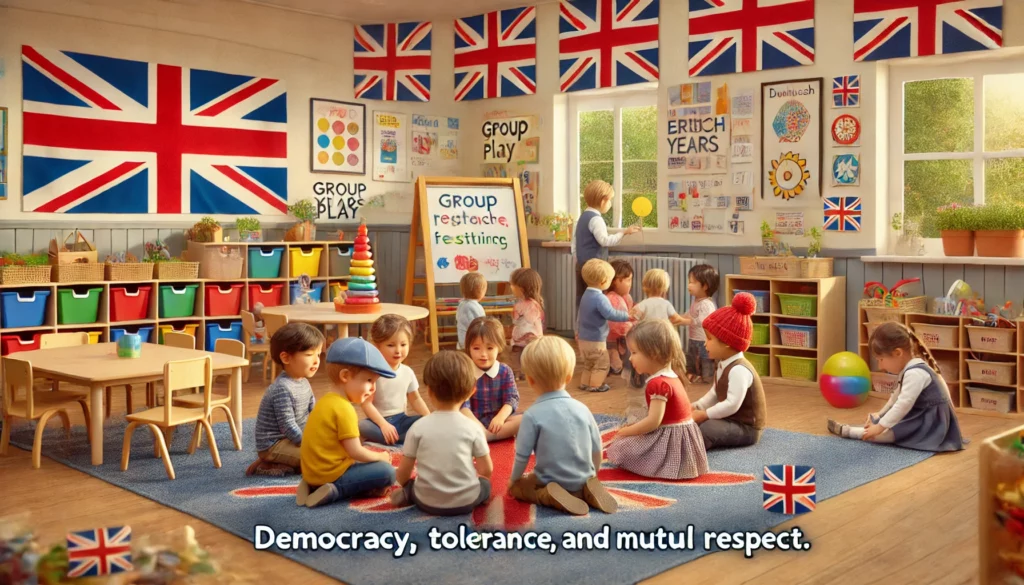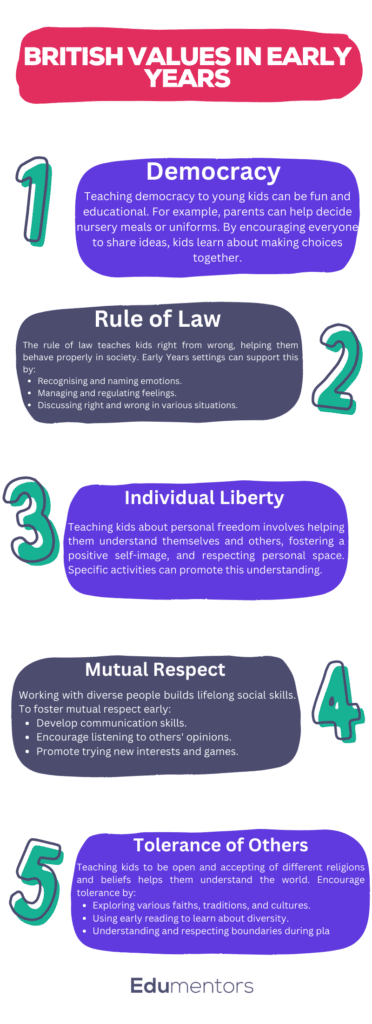British Values EYFS are really important in the early years of school. These values help kids play a good part in Britain’s varied community. They focus on five main ideas: democracy, following laws, personal freedom, respect for everyone, and being open to different religions and beliefs. This blog talks about where these values come from and how to bring them into early years education in fun and effective ways.

The Origins of Fundamental British Values in EYFS
Firstly, British values were brought into schools in 2015 with the Prevent Duty guide. This plan was to stop extreme opinions and keep kids safe. It mixed the ideas of protection and equality. The EYFS system helps by focusing on how children grow personally, socially, and emotionally.
How to Promote Fundamental British Values in Early Years
Thus, teaching British values to young children can be easily combined with the lessons they’re already learning. Here’s how to include the five British values EYFS in your nursery’s daily activities:

1. Democracy
Teaching democracy to young kids can happen in lots of fun ways that help them learn about making decisions together. Furthermore ,ilke we can get parents to help decide what the kids eat at nursery or what their uniforms look like. By doing things that let everyone share their ideas, kids start to learn about what it means to make choices together.
- Making decisions as a group or in pairs.
- Negotiating which game to play.
- Listening to others’ opinions and thoughts.
- Playing games with fair rules.
- Sticking to agreed plans.
2. Rule of Law
However, the rule of law teaches kids what’s right and wrong, helping them act properly in society. Early Years settings can support this by:
- Recognising and naming feelings and emotions.
- Managing feelings and experimenting with emotional regulation strategies.
- Discussing and reflecting on right and wrong in different situations.
- Setting personal boundaries with peers.
- Consistently applying consequences linked to actions.
3. Individual Liberty
Teaching kids about personal freedom means guiding them to know themselves and others better, while also encouraging a good self-image and the concept of personal space. To help with this, there are activities designed specifically for promoting personal freedom.
- Boosting confidence to share views and opinions.
- Increasing understanding of different relationships.
- Developing awareness of other communities and roles within them.
- Encouraging a positive sense of self.
4. Mutual Respect
Working well with different kinds of people helps us learn important social skills that last a lifetime. To build mutual respect early on:
- Develop language and communication skills.
- Encourage listening to others’ opinions.
- Promote joining in with new interests and games.
- Teach empathy and celebrate different strengths in others.
5. Tolerance of Others
Teaching kids to be open and accepting of different religions and beliefs helps them learn more about the world around them. Some ways to encourage tolerance include:
- Exploring different faiths, traditions, and cultures.
- Using early reading activities to learn about diversity.
- Understanding and accepting others’ boundaries during play.
Practical Strategies for Engaging Parents
Getting parents involved in supporting British values is really important, and there are some great ways to do this. One method is to give parents educational materials about big topics like gender stereotypes and racial diversity. Having coffee mornings is another good way to talk about these important subjects with parents in a friendly and engaging environment. Also, sending out articles through nursery software makes it super easy for parents to find and read helpful information, so they can encourage these values with their families at home.
Professional Development and Continuous Improvement
Firstly, to make sure your nursery is doing a great job at sharing British values EYFS, it’s a good idea to often check how you do things and what rules you follow. Training programs like the one from Persona Doll Training called Talking Points can really help your team talk about equality, diversity, and being inclusive in a way that’s easy and laid back.
Conclusion
Teaching young kids about British values EYFS is really important in places like nurseries, but it’s not just about following the rules. It’s about creating a welcoming place where kids learn to respect and enjoy how different we all are. Moreover, when these values are part of the regular day activities and when parents and the local community get involved, nurseries can make sure every child feels included and valued. By paying attention to important ideas like democracy, the importance of laws, freedom, respect for each other, and accepting differences, nurseries help kids grow up to be respectful people who value and add to the diverse culture of Great Britain.
Edumentors tutors create an environment where learners can seamlessly integrate tutorials into everyday life, paving a broader route to enhanced scholastic and personal equilibrium. Their skill in customizing tutorial sessions based on individuals’ unique learning practices is of immense worth – providing them with singularly befitting support levels that make studying efficacious as well as engaging! It’s remarkable how education becomes truly fascinating when delivered this way,constituting sheer merriment, wouldn’t you agree?









